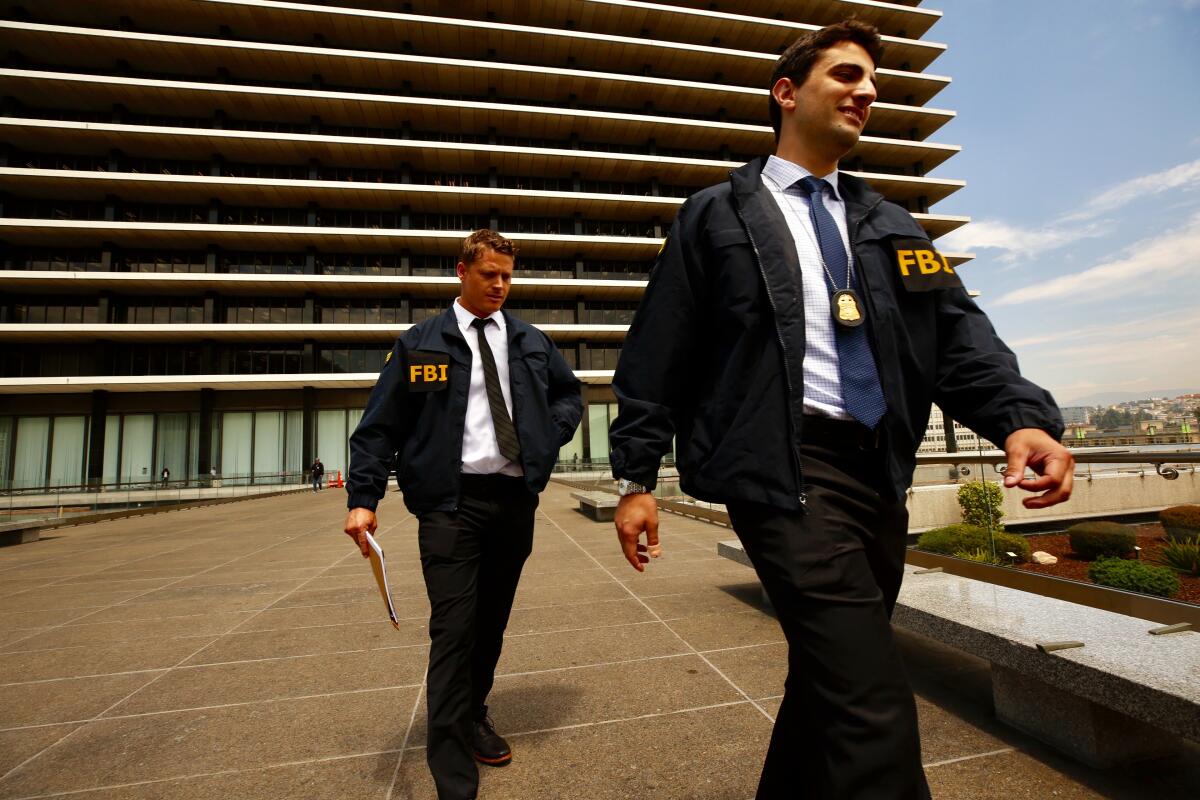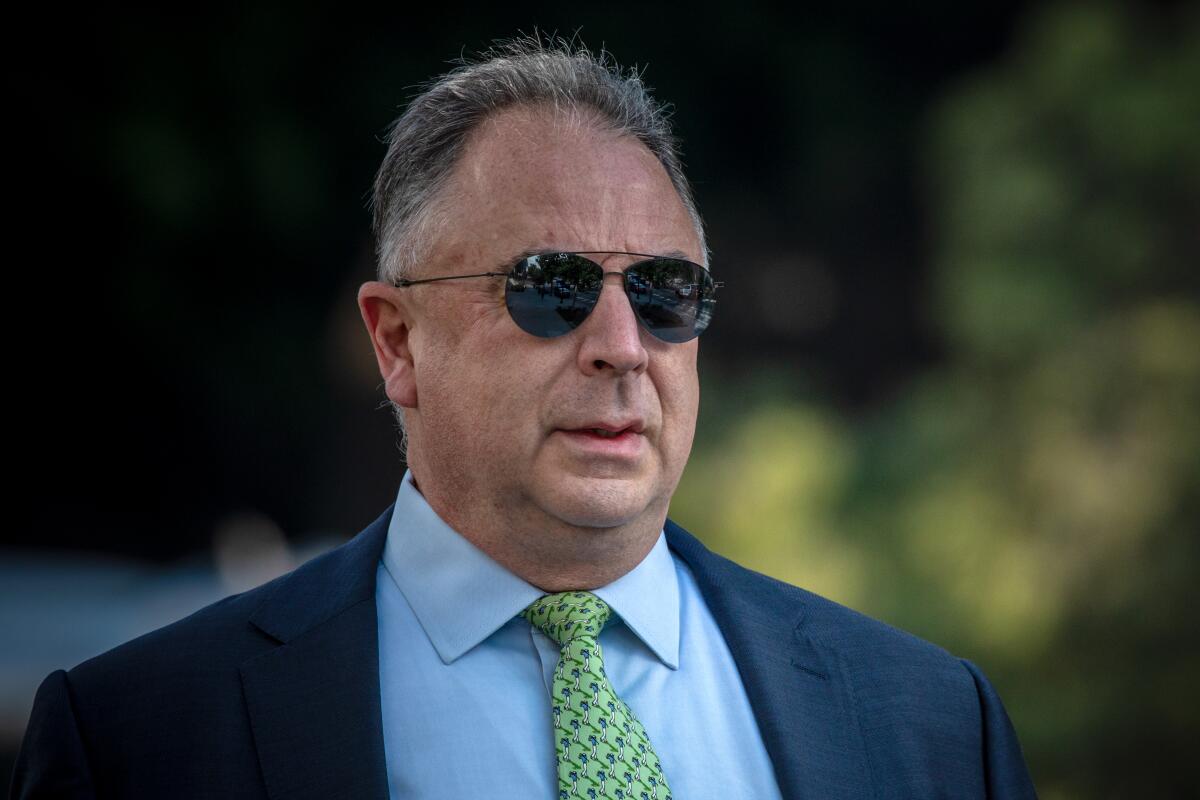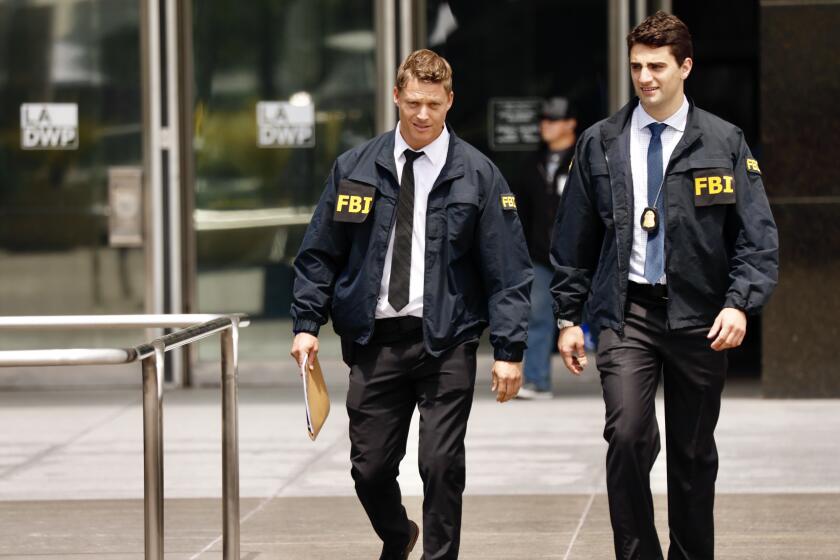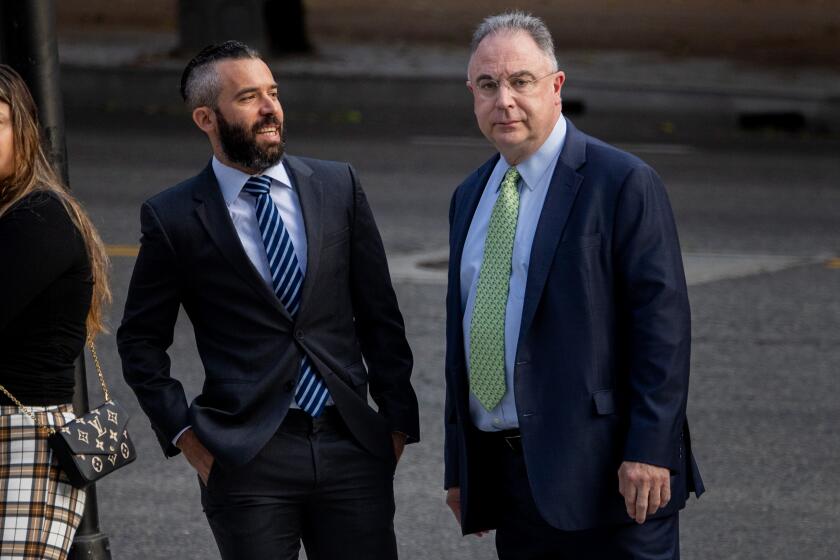DWP board members held private contract talks with vendor, prompting ethics questions

- Share via
Two members of the Los Angeles Board of Water and Power Commissioners — a former Democratic congressman and a City Hall veteran — privately discussed a DWP contract with executives of a cybersecurity company, an exchange that is raising concerns from ethics experts.
Then-DWP commission President Mel Levine and then-Vice President Cynthia McClain-Hill held a roughly 36-minute phone call in 2019 with two executives to walk them through the utility’s plans to award them a contract.
Weeks later, the commissioners voted to approve a 60-day, $3.6-million contract with the company and two other firms. Under the agreement, the cybersecurity company, Ardent Cyber Solutions, was estimated to get about 75% of the work.
The city’s ethics law bars commissioners from privately participating in the review or negotiation of contracts that they will vote on. DWP board rules also bar commissioners from having private discussions about bids with vendors.
Both Levine’s attorney, Daniel Shallman, and McClain-Hill said the conversation was proper. The aim was to ensure that the Ardent executives, who were working on DWP cybersecurity under a different contract, remained on the job at the utility, they said.
Both also said that protecting the DWP — which could face attacks on its water supply and electrical grid — was the goal.
On the call, which was secretly recorded, the commissioners discussed billing, when the DWP board would vote on the contract and the date the utility would give the company its first work order.
DWP commissioners are volunteers appointed by the mayor. They vote on multimillion-dollar contracts at public meetings, oversee the department and carry out the policies of the mayor.

Levine’s attorney and McClain-Hill said the two commissioners were not involved in the vetting of Ardent as a vendor — or any other aspect of the competitive bidding process for cybersecurity work — because that was handled by the Southern California Public Power Authority.
The power authority is a group of about a dozen utilities, including the DWP, that enters into master agreements with vendors for its members.
In Ardent’s case, the DWP opted for its own short-term contract with the company, rather than seek work through the power authority’s agreement.
With its own contract, the DWP could set its own terms for Ardent’s billing schedule, but also rely on the power authority’s vetting process, McClain-Hill told the executives on the call.
McClain-Hill, now the president of the DWP commission board, acknowledged to The Times that it was unusual for her and Levine to involve themselves in the discussion that would normally be handled by staff.
“During my tenure as a member of the Board of Water and Power Commissioners I have always conducted myself ethically and have never engaged in any wrongful or unlawful conduct,” McClain-Hill said.
Shallman, Levine’s attorney, said that the transcript of the call shows that “Mel acted in the best interests of DWP and its customers, and fully complied with all applicable laws.”
Levine represented the L.A. area for a decade in Congress until 1993, and left the DWP board in 2020.
The long-running federal investigation into the Los Angeles city attorney’s office and the Department of Water and Power is over. But many questions remain.
Some ethics experts interviewed by The Times questioned whether the commissioners complied with city ethics rules.
Section 49.5.11 of the city’s ethics ordinance states: “Except at a public meeting, a member of a City board or commission shall not participate in the development, review, evaluation, or negotiation of or the recommendation process for bids, proposals, or any other requests for the award or termination of a contract, amendment, or change order involving that board, commission, or agency.”
Other sections of the ordinance forbid commissioners from revealing confidential information.
Even if the Southern California Public Power Authority picked Ardent for a contract, the DWP had the ultimate contracting authority, so “the communication is still improper,” said Neama Rahmani, a former assistant U.S. attorney and former director of enforcement for the city’s Ethics Commission.
“Wrong, wrong, wrong. Period,” said Laura Chick, the former L.A. city controller and City Council member. “They shouldn’t be having a separate conversation with a bidder. And they probably shouldn’t be having a private conversation with them ever — unless staff are present.”
Levine and McClain-Hill, who are both attorneys, were appointed to the DWP board by then-Mayor Eric Garcetti. The phone call first came to light in legal filings, but the full discussion has not previously been reported.
The Times reviewed a recording of the phone call and emailed a transcript to Levine and McClain-Hill.
The call appears to have been covertly recorded by Paul Paradis, a former attorney turned FBI informant in the government’s corruption probe of City Hall.
Paradis said in federal Bankruptcy Court documents that he recorded Levine and McClain-Hill on April 5, 2019, as part of his work for the FBI. Paradis’ court filing was reported in 2022 by Knock LA and Debaser.
Paradis declined to comment on the audio reviewed by The Times. U.S. Attorney’s Office spokesperson Thom Mrozek also declined comment.

The phone call took place as the corruption scandal was unfolding at the highest levels of the DWP and city attorney’s office. It would spill into public view when the FBI searched the two city departments in July 2019.
The government’s investigation focused on cybersecurity contracts, illicit payments and a bogus lawsuit over faulty DWP bills. Paradis worked on the lawsuit for the city and secured DWP contracts before helping the FBI.
The DWP’s top executive, David Wright, later pleaded guilty to a bribery scheme involving Paradis’ cybersecurity company.
Another top DWP executive, David Alexander, later admitted rigging passage of the Ardent contract through the Southern California Public Power Authority by manipulating the scoring through his role on the power authority’s cybersecurity committee.
Prosecutors have never suggested that McClain-Hill, Levine or the two Ardent executives, Jeremy Dodson and Ryan Clarke, knew about Alexander’s manipulation.
At the time of the phone call, Dodson and Clarke had been working at the DWP through Paradis’ company, known as Aventador. Dodson and Clarke formed their own firm, Ardent, after the DWP board canceled the Aventador contract when media reports questioned Paradis’ role in the bogus lawsuit.
On the call, McClain-Hill told Dodson and Clarke that the power authority was going to approve Ardent as a vendor. Then, she explained, the DWP would contract directly with Ardent so the utility could “determine the frequency of the pay, the terms, and conditions of how that occurs.”
Levine is heard assuring the cybersecurity executives that the two commissioners would back the contract when it came before the DWP board.
“We need three votes, and you’ve got two of them right here,” Levine said at one point, describing a timeline for approval.
Dodson and Clarke did not respond to requests for comment. Neither has been accused of wrongdoing.
The commissioners also discussed a strategy to shift public attention away from Ardent, with McClain-Hill telling the executives the plan is to “have the spotlight dim a little” on the company. Under the strategy, a second security company, Archer, and possibly a third would be added to the DWP contract, McClain-Hill said on the call.
Paul Paradis, a cooperating witness in the DWP billing scandal, received 33 months in prison, exceeding the 18 months recommended by prosecutors.
McClain-Hill, who formerly served on the city’s police commission, told The Times she didn’t reveal any confidential information in the call and her “spotlight” comment was about protecting Dodson and Clarke’s reputations amid the media scrutiny on Paradis.
She involved herself with Ardent because of her concerns at the time over the judgment of Wright, then the DWP’s top executive, she told The Times.
Also, McClain-Hill said she knew that the Southern California Public Power Authority was going to pick Ardent as a vendor because Wright told her so before the April 5 call.
The power authority’s cybersecurity committee formally recommended Ardent as a bidder on April 5. Weeks later — on April 18 — the Southern California Public Power Authority board approved a master agreement with Ardent and the other firms.
McClain-Hill continued communicating with Clarke, telling him in a text message days before the DWP board vote that Garcetti’s office wanted the contract broken into three separate agreements so that none would be a double-digit amount. The April 19, 2019, text was reviewed by The Times.
“We will approve a second contract in 45 days and a 3rd contract 45 days after that,” McClain-Hill wrote to Clarke. “We are finally at the end of this road ... hope this works for you.”
Get the lowdown on L.A. politics
Sign up for our L.A. City Hall newsletter to get weekly insights, scoops and analysis.
You may occasionally receive promotional content from the Los Angeles Times.
On April 23, 2019, McClain-Hill, Levine and other members of the DWP board approved the utility’s contract with Ardent, Archer and another firm.
Shallman, the attorney for Levine, when asked about assertions that the DWP had the ultimate contracting authority so commissioners shouldn’t have been discussing the contract, said that Levine “fully complied with all applicable laws.”
“Rather than showing any effort to improperly influence the contracting process or to engage in prohibited negotiations, the transcript shows a good faith effort to ensure continuity of service from qualified professionals in which DWP had already invested time and money,” Shallman said.
“Simply put, Mel did not want to leave DWP vulnerable to cyberthreats because the experts they had hired were scared away by DWP bureaucracy or worried they wouldn’t get paid,” he said.
Sean McMorris, transparency, ethics and accountability program manager at California Common Cause, questioned why staff, rather than the commissioners, didn’t talk to Ardent.
“If the meeting was to hash out the contract and tell the company that they’re going to vote for them, and what the contract would look like — that sort of thing shouldn’t be happening in a private forum,” he said.
“Even if it’s legal, it doesn’t seem appropriate,” McMorris added.
More to Read
Sign up for Essential California
The most important California stories and recommendations in your inbox every morning.
You may occasionally receive promotional content from the Los Angeles Times.














